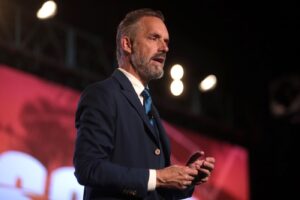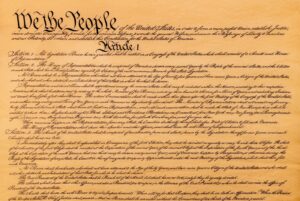In America there is a singular power, impregnable to competing powers. We can call it “the people,” but we really mean the energized majority capable of forming public opinion (though, thankfully, the majority is rarely energized).
Like all singular power, the majority as expressed in public opinion is susceptible to the lure of tyranny. Habit, circumstance, and luck are the primary means that will prevent “the people” from becoming a tyrant. Yet there are also safeguards to American liberty that can enhance the habit of self-rule. Among the safeguards against democratic tyranny is a free press—a press that is fractured, decentralized, and incapable of organizing easily toward common ends.
Deep disappointment about the failure of mainstream media—biased reporting, biased polling—reflects a deeper failure in the ideals of journalism. These ideals—largely a product of the twentieth century—suited a peculiarly modern conception of the democratic nation-state. This conception presumes a national community of informed, engaged citizens who rely on a professional class of journalists to sort out the great complexity of modern life and supply the citizenry with unbiased information. Armed with objective knowledge, citizens can participate meaningfully in a national public square—deliberating, expressing their informed views, compromising, and choosing politicians and policy options.
The history of twentieth-century America led many observers to believe that this kind of engaged community could exist. The experiences of the World War II generation, more than any other, created the prestige of modern journalism and a deep faith in the basic integrity and excellence of the pillars of American media (especially of a few key newspapers and magazines, along with the Big Three networks).
Start your day with Public Discourse
Sign up and get our daily essays sent straight to your inbox.As the Great Depression and World War II centralized power, and as new forms of media (especially radio and television) helped nationalize entertainment and cultural forms, the post-war generation embraced the power and goodness of the federal government and other national institutions. Moreover, they embraced a patriotism guided by abstract devotion to nation rather than by love of the local worlds they knew best.
But the modern conception of a consolidated national community is a necessary if not sufficient condition for the rise of democratic tyranny. Alexis de Tocqueville noted this in the 1830s when he observed that liberty is primarily protected by decentralization and fragmentation when there is only a singular power—the energized majority—with no alternative to check it.
Once the public (the energized majority) becomes sure of some idea or course of action, nothing can stop it from acting. The powerful forces of localism in the 1830s helped prevent this outcome by cultivating diverse interests and opinions, along with conflicting loyalties, that together make it hard to form an energized majority.
Tocqueville stressed how important the free press was in protecting liberties from an energized majority. On the one hand, he argued, “the periodical press is, still, after the people, the first of powers.” But on the other hand, “each newspaper has little power individually.” The weakness of newspapers made the press collectively all the more powerful. Because the United States had no intellectual center—no sole city or region that created national opinion—opinions circulated from widely divergent sources and regions.
In Tocqueville’s day, there was no concept of the objective, unbiased journalist. Nobody assumed that the newspapers posted in the town square or found lying about were anything but opinions mixed with news, or rather something that combined news and opinion in ways most complex. The papers were instruments of circulation, however combined and conflated, and their news came with biases.
Collectively, Tocqueville argued, the press has its “eye always open”; it “constantly lays bare the secret springs of politics and forces public men to come in turn to appear before the court of public opinion.” These partisan newspapers sought constantly to expose their opponents and to persuade the persuadable. Thus, opinions on almost any subject were so varied that, practically speaking, there was no energetic majority on most complicated political questions.
But, while these papers’ local loyalties and partisan language weakened each of them, they gave the collective press a great influence. When the diverse organs of the press begin to “advance along the same track,” wrote Tocqueville, “their influence becomes almost irresistible in the long term, and public opinion, struck always from the same side, ends by yielding under their blows.”
Since the press fostered such diversity of opinions, it often prevented the creation of a national public opinion. The twentieth-century journalistic ideal is precisely the opposite—to foster a national community that overcomes provincialism and local loyalties by empowering individuals to engage as citizens.
These citizens can be part of a national debate on matters beyond the scope of their individual experience because they have a press they trust as the source of knowledge. Yet how can journalists be trusted to explain these matters if they have no wider scope of individual experience than does the average citizen? Once the people place such trust in the rather small band of journalists to give them the proper, undistorted view of the reality beyond their individual experiences, the citizens transfer to these particular elites the power to mold opinions relative to their narrow conceptions of the national good. To the degree that citizens internalize this view of journalism, they lose their natural distrust of authority and try to fit their own views to the emerging power of a palpable public opinion.
Perhaps, then, today’s new media are a force against tyranny. Much handwringing, but also much celebration, has accompanied the rise of the new media. An unusually candid example of distress came from Morley Safer of 60 Minutes who, in an interview on CSPAN, declared that he was appalled at the new media because they undermine the credibility of real journalism. Safer’s comments reflect, almost to the point of caricature, the idealistic view of journalism that I’ve described. On the other side, the recent film “Hating Breitbart” celebrates the power of citizen journalism to break the monopoly of a small clique of opinion-makers and democratize both news-gathering and public discourse.
With a view to protecting American liberty, undermining the credibility of mainstream journalism is a good thing. In this way the rise of the new media (regardless of each site’s political or cultural bias) is useful.
That said, I am quite concerned about other dangers. While I am sure that a vast corps of citizen journalists will expose bias in the media, will break important news, and will increase available knowledge about many important subjects, I doubt that the new media will measurably increase the stock of knowledge (much less truth) among the public.
My interest in the new media springs from their challenge to the credibility of the mainstream press, not their ability to provide a more truthful or democratic alternative. Much like the press in Tocqueville’s time, the new media are fragmented and diverse and circulate opinions nationwide, making it harder to form a national public. On the other hand, these sources of news and opinion are rarely rooted in a locality or a community and they rely on an abstract community of readers—people who have self-identified across the nation with a certain point of view rather than with a specific place and its own way of being. Whether this kind of diversified media will serve a similar role as the very local and provincial sources of the 1830s is unclear.
Be that as it may, liberty in the American tradition requires that the energized majority acts rarely or on minor matters and the new media give us hope that a diverse, biased, and fragmented press will inhibit the creation of a national public.












